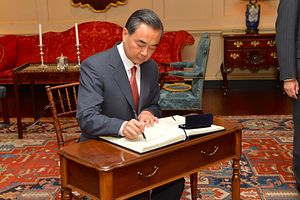Chinese Foreign Minister Wang Yi wrapped up a two-day visit to Pakistan on Friday. Wang met with a number of top Pakistani leaders, including President Mamnoon Hussain, Prime Minister Nawaz Sharif, Sharif’s national security and foreign affairs advisor, Sartaj Aziz, and Army Chief General Raheel Sharif.
Throughout the meetings, both sides affirmed China and Pakistan’s friendship and agreement on various issues. “China-Pakistan friendship is always rock firm regardless of changes in the international and regional situation,” Wang proclaimed. Prime Minister Sharif, for his part, said that friendship with China was the cornerstone of Pakistan’s foreign policy. Sharif also hailed the “the all-weather strategic partnership between the two countries.”
As Ankit noted yesterday for The Pulse, the biggest announcement to come out of Wang’s visit was the confirmation that Chinese President Xi Jinping will visit Pakistan in the coming months. There are no details yet on the timing of the visit, but Pakistani officials had previously said they expected Xi to be the chief guest at Pakistan’s military parade, which will take place on March 23, Pakistan’s national day. The visit will be Xi’s first trip to China’s “iron brother” since assuming office — last year, Xi had to cancel a planned visit to Pakistan due to large-scale protests in Islamabad. Interestingly, this week’s trip was also Wang’s first official visit to Pakistan, though he had previously visited both India (June 2014) and Afghanistan (February 2014).
One major theme of the visit was China and Pakistan’s coordinated efforts to provide for Afghan stability. President Hussain assured Wang that Pakistan is willing to cooperate with China on paving the way for reconciliation and reconstruction in Afghanistan. Wang also announced that China was ready to “support the Afghan government in realizing reconciliation with various political factions including [the] Taliban,” according to Pakistan’s The Express Tribune. Afghanistan, Pakistan, and China recently discussed ways to cooperate to address security threats, with Afghanistan in particular expressing hope that China can help foster more cooperation between Kabul and Islamabad.
However, Wang’s visit was not all about security concerns. The China-Pakistan Economic Corridor (CPEC), part of China’s broader Silk Road Economic Belt and Maritime Silk Road projects, was also a major topic of discussion. Like the larger Silk Road, the CPEC focuses on building up infrastructure in preparation for creating an integrated trade network. While in Pakistan, Wang said that both sides would “boost the construction of the economic corridor” through projects “such as the port of Gwadar, energy, transportation infrastructure, and industry cooperation.” Sharif also underlined Pakistan’s commitment to the project and expressed his “confidence that President Xi’s expected visit would help fast-track CPEC early harvest projects,” according to Dawn.
Of course, this economic initiative is predicated on Pakistan being able to assuage Chinese concerns about the security environment. Beyond the threat to economic cooperation, China is concerned that terrorist activity in Pakistan will spill into Chinese soil. Member of the East Turkestan Islamic Movement (ETIM), a terrorist group that supports Xinjiang independence, are known to operate in Pakistan.
Pakistan is well aware of Chinese worries. Xinhua reported that Pakistan’s president called for the “speedy construction” of the CPEC, while “adding that his country would firmly combat terrorism and spare no effort for the security of Chinese nationals working in Pakistan.” Meanwhile, General Sharif used his meeting with Wang to brief the Chinese foreign minister on the progress Pakistan is making in Operation Zarb-e-azb, a military operation aimed at eliminating terrorist strongholds in Pakistan’s tribal areas. Sharif made a similar presentation during his visit to Beijing in late January.

































